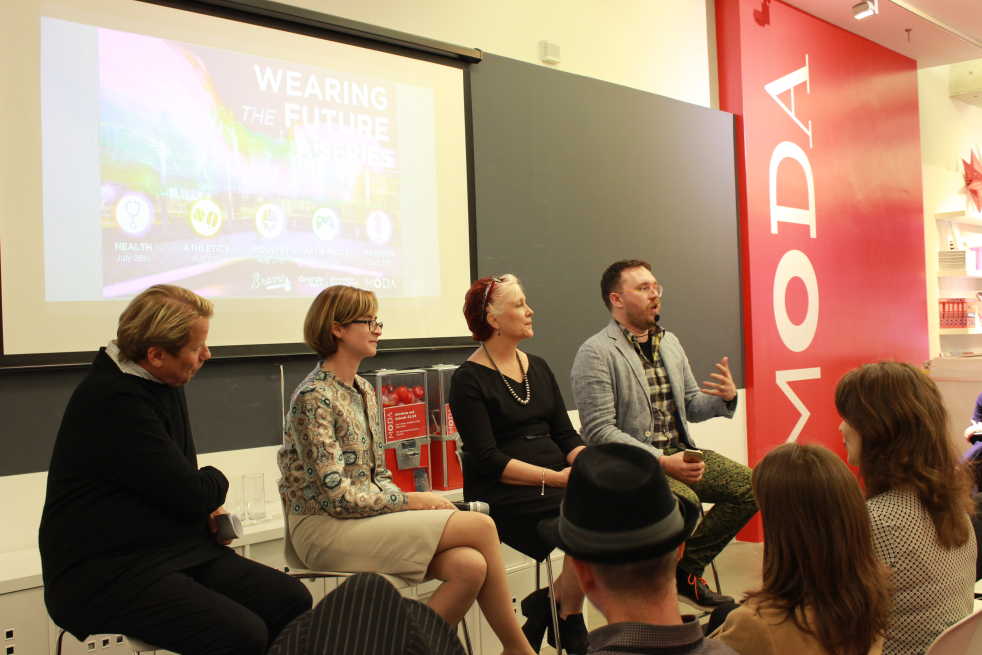Early science fiction predicted we would one day be able to wear our technology. With inventions like the Apple Watch and Oculus Rift, wearable technology is on the rise.
Tech has a Wearable Computing Center with 15 different faculty members. The research of wearable computing combines specialists from computer science, electrical engineering, augmented reality, textiles, fashion and more.
The Wearable Computing Center recently put on a five panel exhibition in collaboration with the Museum of Design Atlanta (MODA) called On You: Wearing Technology. The MODA exhibit, on display until January 2017, features many examples of wearable technology including the PIXI dress and Mi.Mu gloves.
Located in the Midtown Arts District just across the street from the Woodruff Arts Center, MODA seeks to educate people in understanding and appreciating design in terms of both creativity and functionality. MODA holds events for people of all ages and interests, from Minecraft for Adults, to LEGO and Local Brew.
MODA also caters to a younger crowd, with weekend classes, field trips, an after school program and outreach. Future exhibitions at MODA include The Future of Food and Designing a Playful City. College students can get reduced price tickets with a valid student ID.
The PIXI dress is customizable with programmable LEDs to let the user choose what colors and lights the dress is. Mi.Mu gloves were demonstrated by musician Imogen Heap at a TED Global conference. The goal is to use the gloves to control music instead of being behind a computer or sound board. This is more intuitive and more performer-friendly.
The expert panel series concluded on Sept. 29 with their discussion on fashion and wearable technology.
This panel was moderated by Clint Zeagler. Zeagler has a B.S. in Industrial Design with a minor in textiles manufacturing from Tech and received his M.A. in fashion design from Domus Academy in Italy. He is also the Program Manager for the Wearable Computing Center.
One of the panelists, Susan Spencer commented on the definition of fashion.
“Everybody wears clothes, and it’s our primary means of expression outside of our language. When we hit puberty, it’s exactly what we’re all crazy about. It’s what we wear, to say who we are and who we belong to and what we want to be,” Spencer said.
Spencer is the founder and product manager for Valentina, an open source software project to create garment patterns using parametric design.
“With fashion tech, with all these new things with circuitry and electronics being worked into our clothing we can express ourselves in ways we’ve never even thought about before. There’s a huge opportunity here for us to make wearable clothing not just a fashion statement but also to integrate it to a certain point in our everyday world that it expresses who we are,” Spencer said.
Another panelist, Lucy Dunne, Ph.D, explains how significant an impact technology has had on the fashion industry.
“It’s almost as if we’ve been conversing with each other for the whole of human history, and now somebody’s introducing something like humor,” Dunne said. “We have words, and so humor is expressed through the words that we already understand, but we’ve never had humor before.”
Dunne works in wearable technology, smart clothing and apparel design at the University
of Minnesota.
“It’s such a seismic change in what we’re able to express, it’s like a whole new facet to what we can express. And specifically I think I see that in the kind of non-verbal dynamics that we can achieve through technology,” Dunne said.
The Wearable Computing Center at Tech focuses on transitioning wearable technology from the research stage to a viable consumer product.
